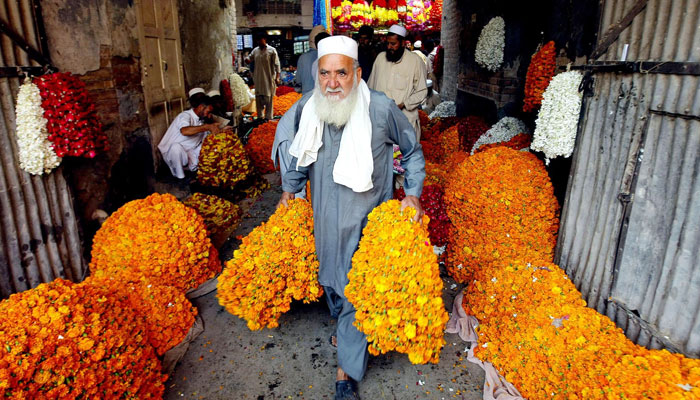Blossoming traditions: Peshawar’s floral market enduring modern challenges
PESHAWAR: In the heart of Peshawar lies a hidden treasure - the floral market, where the fragrance of flowers permeates the air and the colourful blooms tell stories of a trade that has survived for over a century.
Peshawar, often recognised as the “city of flowers”, has a rich floral heritage that spans generations. However, the intricate details of this longstanding trade may elude many. While the enchanting fragrance of blossoms is synonymous with the city, the roots of this floral industry have been part of its culture and intricately woven into Peshawar’s history, where it has flourished for an extensive period.
As the winter season, synonymous with weddings, approaches, the floral trade in the region is gearing up for a bustling period. Peshawar, often hailed as the ‘City of Flowers,’ boasts a rich floral market centered around Ramdas Bazaar. Here, flowers sourced from suburban areas like Mashukhel, Bazidkhel Sheikh Muhammadi, and others find their way into the city, creating a vibrant tapestry of scents and colors.
While the floral trade has deep roots in Peshawar’s history, the landscape is evolving. The burgeoning growth of housing societies, coupled with shifting weather patterns and rising prices, has prompted many cultivators to reconsider their involvement in flower production.
Roses, resilient and available year-round, stand as a symbol of the city’s floral abundance. However, certain blooms like Jafri, jasmine, yellow daffodils, and others grace the market in specific seasons.
The journey of Peshawar’s floral industry, however, has not been without challenges. Harsh weather conditions and soaring inflation have compelled numerous cultivators in and around the city to pivot to alternative crops. The inability of many flowers to complete their growth cycle in these conditions has resulted in a decline in production, leading to financial losses for those involved.
Beyond the local market, Peshawar’s flowers find their way to different cities in Punjab, with some varieties enjoying high demand in Karachi. Yet, the specter of climate change looms large, impacting flower cultivation. Some local farmers, faced with these challenges, have repurposed their agricultural land for housing, while others have reluctantly stepped away from the trade due to financial constraints.
As Peshawar’s floral market navigates these changing seasons and trade challenges, it remains a vibrant testament to the city’s historical connection with flowers, reminding us that even in the face of adversity, the fragrance of tradition continues to bloom.
Peshawar’s identity is intricately woven with the petals of its vibrant blooms. As the city grapples with modernization and commercial expansion, it must not lose sight of the floral legacy that has defined its character for centuries.
In the face of changing landscapes, it’s a collective responsibility to nurture the City of Flowers. The fragrant identity of Peshawar depends on the choices made today to ensure the blossoms continue to tell stories for generations to come.
-
 Margot Robbie Delivers Sweet Message Ahead Of Valentine's Day
Margot Robbie Delivers Sweet Message Ahead Of Valentine's Day -
 How AI Boyfriends Are Winning Hearts In China: Details Might Surprise You
How AI Boyfriends Are Winning Hearts In China: Details Might Surprise You -
 Blake Lively Mocked Over 'dragons' After Latest Court Appearance
Blake Lively Mocked Over 'dragons' After Latest Court Appearance -
 Gmail For Android Now Lets Users Create Labels On Mobile
Gmail For Android Now Lets Users Create Labels On Mobile -
 Emma Slater Reveals Final Moments With James Van Der Beek Before His Death
Emma Slater Reveals Final Moments With James Van Der Beek Before His Death -
 Princess Kate Makes Surprise Visit To Support Mental Health Initiative
Princess Kate Makes Surprise Visit To Support Mental Health Initiative -
 Reese Witherspoon Sparks Nostalgia With 'Green Sisters' Tribute To Jennifer Aniston
Reese Witherspoon Sparks Nostalgia With 'Green Sisters' Tribute To Jennifer Aniston -
 Royal Family Faces Fresh Crisis While Andrew's Controversy Refuses To Die
Royal Family Faces Fresh Crisis While Andrew's Controversy Refuses To Die -
 Travis Kelce’s Mom Talks About Taylor Swift’s Wedding Dance Song And Whether She’s Signed An NDA
Travis Kelce’s Mom Talks About Taylor Swift’s Wedding Dance Song And Whether She’s Signed An NDA -
 James Van Der Beek's Final Days 'hard To Watch' For Loved Ones
James Van Der Beek's Final Days 'hard To Watch' For Loved Ones -
 Lewis Hamilton Ditched Question About Kim Kardashian?
Lewis Hamilton Ditched Question About Kim Kardashian? -
 Will Smith, Jada Pinkett's Marriage Crumbling Under Harassment Lawsuit: Deets
Will Smith, Jada Pinkett's Marriage Crumbling Under Harassment Lawsuit: Deets -
 'Fake' Sexual Assault Report Lands Kentucky Teen In Court
'Fake' Sexual Assault Report Lands Kentucky Teen In Court -
 'Vikings' Star Shares James Van Der Beek's Birthday Video After His Death
'Vikings' Star Shares James Van Der Beek's Birthday Video After His Death -
 Jennifer Aniston Receives Public Love Note From Jim Curtis On 57th Birthday
Jennifer Aniston Receives Public Love Note From Jim Curtis On 57th Birthday -
 Microsoft AI Chief Says AI Will Replace Most White-collar Jobs Within 18 Months
Microsoft AI Chief Says AI Will Replace Most White-collar Jobs Within 18 Months




